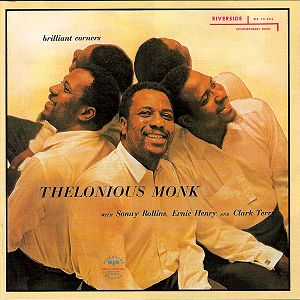1. Brilliant Corners
2. Ba-lue Bolivar Ba-lues-are
3. Pannonica
4. I Surrender, Dear
5. Bemsha Swing
6. Pannonica (incomplete)
Thelonious Monk - Piano, celeste
Ernie Henry - Alto sax (tracks 1-4, 6)
Sonny Rollins - Tenor sax
Clark Terry - Trumpet (track 5)
Oscar Pettiford - Bass (tracks 1-4, 6)
Paul Chambers - Bass (track 5)
Max Roach - Drums, trimpani
Thelonious Monk was one of
the most "difficult" musicians in jazz - and
this is one of his most difficult albums.
He always trod his own very individual path,
creating new jagged rhythms and seemingly
often playing the gaps between the notes on
the piano. His compositions could be difficult,
too - the title-track took more than 20 takes
to get down on disc satisfactorily.
Yet, strangely enough, this
album established Monk more decisively than
most of his previous recordings. His two earlier
Riverside albums had concentrated on tunes
by Duke Ellington and jazz standards, but
this 1956 album allowed Thelonious to feature
his own compositions as four of the five tracks
(track 6 is a minimal bonus: an attempt at
Pannonica which breaks down after the
first chorus).
The title-track was understandably
hard for the musicians to get their heads
round. It doubles the tempo on alternate choruses
and has an edgy theme typical of Monk. You
can hear Max Roach manfully trying to fit
his drumming to Monk's dislocated style. On
the comparatively straightforward Bemsha
Swing, Max plays timpani as well as the
conventional drums, sounding at times like
a thunderstorm passing nearby. But his solos
throughout the album are typically well-constructed.
Sonny Rollins is the ideal
tenorist for this session, as his playing
has a nervy energy similar to Monk's. Altoist
Ernie Henry sometimes sounds less happy, even
though he had previously worked in Thelonious's
quartet. He actually died the year after this
recording was made, at the early age of 31.
He is replaced on Bemsha Swing by Clark
Terry - not, one might have thought, an obvious
choice of a musician for a Monk session, but
he acquits himself well.
On Pannonica, Monk
plays a rather tinny-sounding celeste as well
as piano, and I Surrender, Dear is
a piano solo which is possibly the most accessible
track on the album - because Monk is playing
a familiar tune.
I can't say that this CD
is "easy listening" - in fact it might be
classified as "uneasy listening". I certainly
prefer many of Thelnious's other albums -
which would be a better place for newcomers
to start, since this one might put them off.
Nevertheless, this is an important album in
Monk's career development.
Tony Augarde
